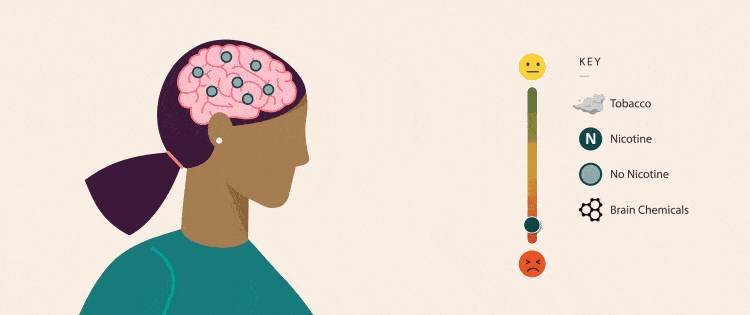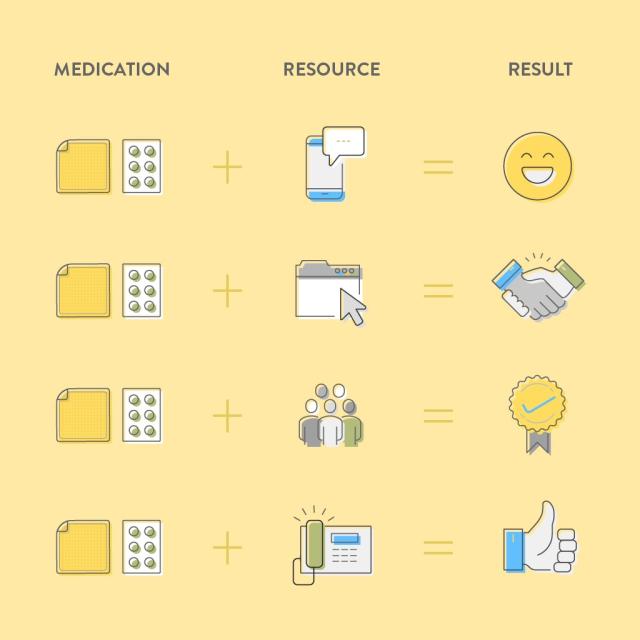Medications that can help you quit can double or even triple your chances of quitting for good. They help to reduce withdrawal symptoms and cravings for tobacco. Talk to your healthcare provider about medications and counseling that can help you quit. Using a combination of quit medications and counseling can make you up to four times more likely to stay quit than using nothing!

Tobacco Addiction in the Brain
Nicotine is the chemical in tobacco that causes addiction. Tobacco products also contain many other harmful substances that can impact your health.
When you smoke, the nicotine goes quickly through your bloodstream to your brain. In your brain, nicotine triggers the release of chemicals that create a buzz of pleasure and energy.
As you continue to smoke and use tobacco, your brain needs more nicotine to get the same pleasurable feelings. In between cigarettes or other tobacco use, the brain chemicals released by tobacco decline. This can leave you feeling irritable, foggy, and uncomfortable. When you quit tobacco, these feelings of discomfort can continue, and you may also have trouble sleeping. This is all part of the process called nicotine withdrawal. The cycle of using tobacco in order to get nicotine to release chemicals in the brain to prevent withdrawal is what leads to tobacco addiction. About 80% to 90% of people who smoke regularly are addicted to nicotine.

How Medications Can Help
The medications described below all act on parts of your brain to help reduce the symptoms of withdrawal that people get when they stop smoking or using tobacco. These medications that can help you quit are sometimes known as "tobacco cessation medications," “quit smoking medications,” or just "quit medications." They work in different ways, and you should talk with your healthcare provider about which one is best for you.
Talk to Your Healthcare Provider
Talking with a healthcare provider is a great first step in quitting tobacco. They will be able to work with you to determine the treatment option that is best for you, including medications and counseling. Discuss with your provider what the best type of nicotine replacement therapy (NRT) or other quit medication might be right for you and what dosage they recommend. Tell them what medications and other quit methods you have used in the past and how you responded to them; how much you currently smoke, dip, or chew; and any other medical conditions you have so that you can find a medication and quit plan that works for you and your life. Here are some questions to ask your provider when discussing medications:
- When do I start the medication?
- How long is the medication used for?
- How do I properly use the medication?
- What happens if I slip and use tobacco while taking this medication?
- What are the potential side effects? Is there anything I can do to minimize them?
- Is this medication right for me, given my medical history?
Don’t Forget Counseling
Quit medications can help reduce cravings and withdrawal symptoms, but they won’t do all the work. To give yourself the best chance for success, combine medication with counseling. Counseling helps you change your daily routines to avoid using tobacco. It also can help you think differently about your triggers and give you strategies and skills to handle stress and anxiety without picking up a cigarette, pouch, or can. Counseling can be in person or through phone or telehealth sessions with a provider at your VA medical center or clinic, or through the free telephone quitline at
1-855-QUIT-VET (1-855-784-8838). Find a counseling resource here or ask your provider for advice.
Types of FDA-approved Quit Medications
- Nicotine Replacement Therapy
NRT is a safe, effective, and widely used quit medication. Your VA healthcare provider can give you a prescription to get NRT from your VA pharmacy. It is also available without a prescription from your local non-VA pharmacy.
NRT reduces withdrawal feelings by giving you a small, controlled, amount of nicotine but none of the other dangerous chemicals found in cigarettes. This small amount of nicotine helps satisfy your craving for nicotine and reduce the urge to smoke by triggering some of the same brain chemicals as nicotine in tobacco. The nicotine in NRT is absorbed much more slowly by the body than the nicotine in tobacco, which means it won’t cause addiction.
Patches, gum, and lozenges are types of NRT. There are also some types of NRT that are only available with a prescription from your provider. The patch is a long-acting form that releases a small, steady amount of nicotine through the skin. Short-acting gum and lozenges release a small amount of nicotine into the lining of your mouth. You may still have cravings while using NRT. To fight cravings, your provider may recommend using combination NRT. This consists of a long-acting form of NRT like the patch along with a short-acting gum or lozenge. You are up to 4 times more likely to quit successfully when using combination NRT.
Learn more and find a method that may be right for you using our NRT explorer.
- Bupropion SR
Bupropion SR is a medication that contains no nicotine. You need a prescription to get this medication. It may help with withdrawal and reduce the urge to smoke. Bupropion acts on the brain to cause higher levels of chemicals that make you feel good and alert. That means that you feel fewer withdrawal symptoms when you use bupropion. You can combine this medication with NRT such as the gum or lozenge to help with cravings. Using bupropion can double your chances of quitting successfully. Always use medications as prescribed by your healthcare provider.
- Varenicline
Varenicline is a medication that contains no nicotine. You need a prescription to get this medication. This drug eases withdrawal symptoms and blocks the effects of nicotine from cigarettes if you start smoking again. Varenicline binds to the same parts of your brain that nicotine does. That means that the drug helps you quit because it reduces the full force of the brain chemicals from nicotine but releases enough to counter the negative feelings of nicotine withdrawal. Using varenicline can triple your chances of quitting successfully. Always use medications as prescribed by your healthcare provider.
VA offers Veterans all the quit smoking medications approved by the U.S. Food and Drug Administration. Use this locator to find a VA facility in your area or you can also sign in to My HealtheVet and send a question to your VA primary or mental healthcare provider. If you don’t receive health care from VA, check your insurance plan to see if it covers quit smoking medications.
VA has patient medication guides that describe how to use NRT and other quit smoking medications. Always use medications as prescribed by your healthcare provider.







